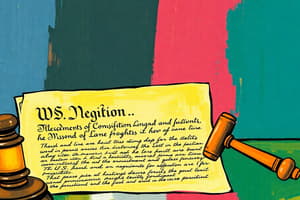Podcast
Questions and Answers
What does the First Amendment guarantee?
What does the First Amendment guarantee?
- Freedom of Religion (correct)
- Right to Bear Arms
- Search and Seizure
- Quartering of Troops
What right does the Second Amendment provide?
What right does the Second Amendment provide?
Right to Bear Arms
The Third Amendment allows the government to forcibly house military personnel in private homes during peacetime.
The Third Amendment allows the government to forcibly house military personnel in private homes during peacetime.
False (B)
What does the Fourth Amendment protect against?
What does the Fourth Amendment protect against?
What protections does the Fifth Amendment provide?
What protections does the Fifth Amendment provide?
List some rights guaranteed by the Sixth Amendment.
List some rights guaranteed by the Sixth Amendment.
Study Notes
First Amendment
- Guarantees freedoms of religion, expression, assembly, and petition.
- Prohibits Congress from establishing a religion or restricting individual practices.
- Ensures freedom of speech and press are protected from governmental interference.
- Allows citizens to assemble peaceably and petition the government for grievances.
Second Amendment
- Grants the right to bear arms for self-defense.
- Initially applied to the federal government but now extends to states via the Fourteenth Amendment.
- Emphasizes the necessity of a well-regulated militia for state security.
Third Amendment
- Prohibits quartering of soldiers in private homes during peacetime without owner consent.
- Military housing of personnel requires a law-prescribed process during wartime.
- Generally considered a non-controversial amendment, with no Supreme Court litigation.
Fourth Amendment
- Protects against unreasonable searches and seizures by the government.
- Establishes the principle that individuals have a right to privacy in their homes and belongings.
- Requires probable cause for warrants, including specific details of the search and what is to be seized.
Fifth Amendment
- Establishes rights related to criminal and civil legal proceedings.
- Guarantees a grand jury for capital or infamous crimes and prohibits double jeopardy.
- Protects against self-incrimination and ensures due process of law in deprivation of life, liberty, or property.
- Mandates compensation for citizens whose property is taken for public use.
Sixth Amendment
- Ensures rights for criminal defendants, including a prompt public trial.
- Guarantees the right to legal counsel and an impartial jury.
- Empowers defendants to understand their charges and confront their accusers.
- Relevant in high-profile cases, including those related to terrorism and witness protection.
Studying That Suits You
Use AI to generate personalized quizzes and flashcards to suit your learning preferences.
Description
Test your knowledge on the First to Fourth Amendments of the United States Constitution. This quiz covers essential freedoms, rights, and protections guaranteed to citizens, including freedoms of speech, assembly, and the right to bear arms. Challenge yourself and see how well you understand these crucial aspects of American law.




